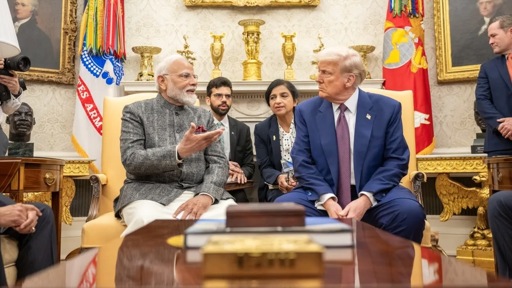India’s Ministry of External Affairs objected to US President Donald Trump’s announcement on Wednesday, August 6, raising the total tariffs on imports from the country to 50%. It called the move “unfair, unjustified and unreasonable” and vowed to take the necessary actions to protect India’s national interest.
“We have already made clear our position on these issues, including the fact that our imports are based on market factors and done with the overall objective of ensuring the energy security of 1.4 billion people of India,” India’s MEA said in response to Trump’s claims that the additional 25% tariffs announced on Wednesday were in fact a “penalty” for India importing oil and weapons from Russia.
Last week, Trump had announced a 25% tariff on Indian imports and warned of an additional “penalty” over India buying Russian oil and weapons, without specifying the rate until the Wednesday announcement.
The US administration had claimed that by buying its oil and weapons from Russia, India has emerged as a major supporter of the war in Ukraine.
India’s MEA tried to defuse the accusations by arguing that several other countries, including some in the EU also continue to trade with Russia. “It is extremely unfortunate that the US should choose to impose additional tariffs on India for actions that several other countries are also taking in their own national interest,” India said.
The 25% tariffs imposed last week are effective from August 1, while the additional tariffs announced on Wednesday will take effect August 28.
The 21-day period is seen as a window for a possible negotiated resolution.
With the announcements on Wednesday, India became, alongside Brazil, the country facing the highest tariff under Trump’s so-called reciprocal tariff regime announced in April this year.
Read more: Lula demands respect for Brazil’s sovereignty after Trump’s statements
Last year, India had a trade surplus of USD 46 billion with the US, the total volume of which was just above USD 190 billion. The US is India’s second largest trading partner after China.
Sticking points
Trump’s imposition of high tariffs against India is also attributed to the failure of both countries to reach a trade deal before the August 1 deadline. This is despite the fact that India was one of the first countries to start trade negotiations with the Trump administration in February during Prime Minister Narendra Modi’s visit to the country.
The US has accused India of using strong protectionist measures to prevent US companies from doing business in several crucial sectors in India, claiming that India imposes one of “the highest tariff rates in the world”.
Since the beginning of the talks, India has reduced tariffs on Bourbon Whisky and motorcycles imported from the US and proposed to reduce tariffs on other industrial products to zero, as per a report in Reuters.
Industrial products are the largest components of India’s imports from the US and accounted for almost 40% of its total value last year.
India has also agreed to buy more energy and defense products from the US.
However, as per reports, the US has insisted that India open its dairy and agriculture sectors and reduce the high tariffs on them. These are the key sticking points in the trade negotiations.
Given the strong domestic opposition in India against such moves, the Modi government finds it difficult to open the dairy and agriculture sectors to US companies. Farmers groups and left parties have already expressed their anger over India’s trade deal with the UK, claiming it surrenders the interests of millions of farmers and warned against any such deal with the EU and the US.
Modi, while speaking in an event in Delhi on Thursday, claimed that his government will “never compromise on the wellbeing of its farmers, dairy and fishermen.”
It is already clear that if the 50% tariff remains it will negatively affect several industrial sectors in India, particularly the clothes, gems and jewelry, and pharmaceuticals, which mostly thrive because of their cost effectiveness, experts have argued. This may compromise millions of jobs.
Reuters reported that several Indian industries have already expressed fear that their sectors may not be able to endure such high tariffs and have sought help from the state.
Imperialist move must be resisted
Several opposition groups, such as the Indian National Congress (INC), the left parties, such as Communist Party of India (Marxist), various trade union groups, including Centre for Indian Trade Unions (CITU), and farmer’s unions like the Samyukta Kisan Morcha (SKM), issued statements condemning Trump’s move. Most of them called it a “weaponization of tariffs for imperialist gains” and urged the Indian government to resist it by consolidating existing global alternatives, such as the BRICS.
“The US imposition of additional 25% of tariffs threatening India to discontinue the oil imports from Russia directly or indirectly, exposes the ugly face of imperialism and its hell-bent bid to undermine the sovereignty and solemn rights of India to have independent trade relations in accordance with its national interests,” CITU said in a press release on Thursday.
CITU criticized the Indian government’s failure to adequately respond to the US threats in a timely manner, urging it to work to consolidate the available alternative international mechanisms, such as the BRICS, to “counter the US and its imperialist designs”.
CPI (M) called for demonstrations across the country “against US bullying and in defense of our country’s economic sovereignty”.
“The US is abusing its economic and military might to impose an unjust and chaotic world order thus targeting India. India cannot surrender its sovereignty to please the US,” said SKM, demanding the government take the people of India into confidence to build a united resistance against the “imperialist tactics” of the US.
The post Trump raises tariffs on India to 50%, Delhi calls move “unjustified and unreasonable” appeared first on Peoples Dispatch.
From Peoples Dispatch via this RSS feed


